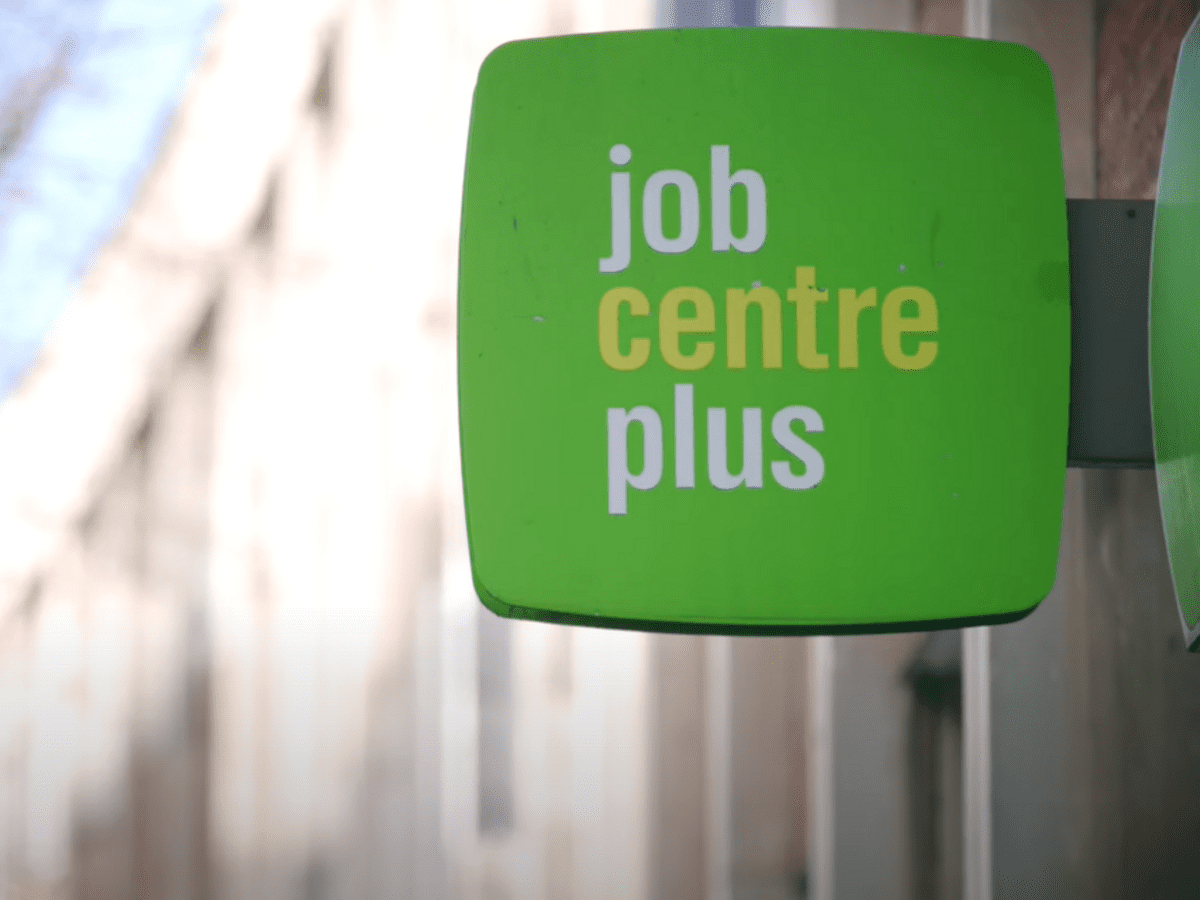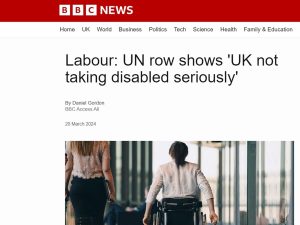Another day, another disturbing Tory scheme to fuck over chronically ill and disabled people. In the UK government’s latest state-of-the-art vanity project to drive up its dire employment rate statistics, the Department for Work and Pensions (DWP) is funnelling millions into the pockets of obscure AI companies. What could possibly go wrong?
DWP AI “back to work” drive
On 14 April, the DWP announced it had awarded £1.5m to companies working to “boost occupational health services for small and medium-sized businesses.”
Tellingly, its press release said that the investment was to:
to tackle in work sickness and boost economic activity
In other words, the projects are part of the government’s plans to push sick people into, and keep them in work. For this, it awarded the funding between five companies. These were: Wellics Ltd, Kinseed Limited, Elaros 24/7 Limited, Latus Health Ltd, and Armour Labs Ltd.
So what ingenious support will these companies be offering? Well, the DWP wasn’t shy in boasting the answer. A significant element of the investment will go towards artificial intelligence (AI) occupational health programmes.
One such company delivering this AI will be Wellics Ltd. Predictably, the company leans into the warm, fuzzy wellbeing rhetoric. On its website, Wellics explains that its technology:
provides a comprehensive view of employee well-being by measuring four key areas: sleep, mental well-being, nutrition, and physical activity. This data can be used to identify areas where employees need support and track their progress over time.
So, employers snooping on employees’ health, and how they are managing it, then? Got it. Of course, this could spell particular trouble for chronically ill people, but it’s right up the toxic Tories street. Notably, it’s entirely in step with a government agenda hell-bent on harassing sick people back to work.
Dressed up wellbeing guff
Significantly, one of the awardees – Kinseed – may show what this could mean in practice for one sizeable group of chronically ill people. As the DWP explained, the company:
is developing a revolutionary cloud-based occupational health platform aimed at offering employers’ powerful new tools to help maintain and improve employee health and wellbeing.
Their new service “MediWork” is breaking ground with AI and uses data to monitor individual health trends and identifies early warning signs of ill health. It will tailor suggestions to improve workplace wellbeing, and help clinicians do their job more effectively and quickly than before.
Again, the AI service dresses up in wellbeing language, but, emphasis on the “employers’ powerful new tools”. It suggests the potential for employer control over employee health information. Coupled with the DWP’s garble about “economic inactivity” and supporting a “more productive workforce”, it’s not rocket science to see where that could end. Put another way, it’s for sating the capitalist urge to squeeze every last drop of profit from ill employees.
Predictably then, the government is already sizing up the role of this AI technology for people with long Covid. Specifically, its press release said AI and new occupational health tech will be:
at heart of revolution including expansion of remote services, digital health hubs, and Long Covid support.
Notably, Kinseed offers instructive insight into where this might lead next.
Graded exercise therapy 101
According to its website, Kinseed is partnering with the occupational health company Cordell Health to develop this.
And Cordell’s advice document for long Covid sounds a lot like its advocating for a dangerous treatment that has harmed people living with a related chronic illness:
Keep as active as possible whilst ensuring that activities are commensurate with levels of energy. Those affected may find it useful to keep a diary in order to track activity and monitor steady improvements over time. Rest is important but resting too much increases the risk of losing muscle mass and delaying recovery.
This screams graded exercise therapy (GET) 101. Notably, this ‘therapy’ involves a gradual increase in physical activity. Practitioners have prescribed this as the primary treatment for people living with myalgic encephalomyelitis (ME).
However, the treatment is actively harmful to people living with ME. This is due to the disease’s hallmark feature – post exertional malaise (PEM). PEM causes a disproportionate worsening of multiple debilitating symptoms after physical, mental, social, or emotional exertion.
Despite this, medical professionals subscribed to the biopsychosocial model of ME have repeatedly pushed the treatment. This is the view that ME is largely psychosomatic in origin – or in short – that the disease is all in the patient’s head.
Of course, this is palpable bullsh*t and multiple international organisations, national health bodies, and scientists have time and again proven the disease is biophysiological and impacts multiple systems in the body.
Psychologisation and so-called “scroungers”
Nonetheless, a vocal pyschologising lobby has monopolised the funding for research and played gatekeeper to the treatment for people living with the disease for many years. For example, until 2021, the UK’s health body the National Institute for Health and Care Excellence had maintained it in its guidelines.
However, the damage has been done. Many people living with ME have reported the devastating impact GET has had on their health. Given that over 50% of people living with long Covid meet the diagnostic criteria for ME, the treatment is inappropriate – in fact, dangerous – for many patients with the condition.
Yet, as the Canary has pointed out before, psychologising chronic illnesses has also served as the perfect excuse to deprive sick people of access to benefits. What’s more, Cordell Health’s guidance plays into “deconditioning theory” – another erroneous trope perpetuated by psychologisers of the disease.
Essentially, this is the notion that people living with ME are making themselves sicker by not exercising. Again, studies have debunked this. In spite of this however, the sham theory fits nicely alongside a toxic government campaign to brand sick and disabled benefit claimants as “scroungers”.
Weaponizing DWP AI against chronic illness
At the same time, the Canary’s Steve Topple has highlighted how the NHS has removed long Covid treatment targets. More significantly, this coincided with the NHS England’s appointment of one notorious psychiatrist as an executive director.
Specifically, psychiatrist Simon Wessely took to the helm in January 2023. The NHS board is the institution’s main decision-making body. Wessely is a prominent, powerful proponent of this psychologising crusade against people living with ME.
You can read more about Wessely and his alarming influence on ME treatment here. But effectively, the staunch biopsychosocial acolyte holds huge sway over the direction of treatment for people with ME. So, as Topple expressed:
his psychiatric approach to physical illness, coupled with his new job, may indicate the path the NHS is heading further down – and not just regarding long Covid.
Now, the DWP looks to be aligning workplaces with this dangerous psychologisation too. Naturally, it has form on this already. Crucially, it was DWP-sponsored medical trials which cemented GET as a core NHS treatment for people with ME. Of course, it didn’t do so out of the goodness of its heart to help people suffering the daily horror of the devastating disease. Now, it sure as hell isn’t sponsoring these new AI programmes to help out chronically ill people either.
And it wouldn’t be the first time that the DWP has weaponized AI against chronically sick and disabled people. As the Disability News Service reported in February 2022, the department has been using an AI algorithm to select benefit claimants for fraud investigations. Yet campaigners have highlighted that it could be using this to discriminate against disabled claimants.
Government washing its hands of vulnerable people
So, what we have is AI spying on sick people in work, and AI spying on sick people not in work. Ultimately, this new DWP AI guff is just the government’s latest dodgy gambit to bring sick and disabled people under the thumb of the exploitative capitalist market.
Of course, it’s nothing new. As chronically ill and disabled folks, and indeed any marginalised community can tell you, if you’re not ‘productive’ – that is, running yourself into the ground for corporate paymasters – you’re expendable.
At the end of the day, it looks to be another ploy to push the blame for poverty and sickness onto poor and sick people themselves. Successive governments and their corporate media mouthpieces have long been saying if you’re poor and sick, it’s on you. Now, some corporate AI will make sure you know it too.
Feature image via YouTube – Department for Work and Pensions




